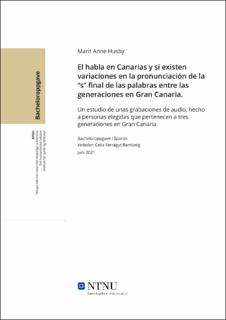| dc.contributor.advisor | Ferragut Bamberg, Celia | |
| dc.contributor.author | Husby, Marit Anne | |
| dc.date.accessioned | 2022-02-18T18:22:19Z | |
| dc.date.available | 2022-02-18T18:22:19Z | |
| dc.date.issued | 2021 | |
| dc.identifier | no.ntnu:inspera:80529865:35714734 | |
| dc.identifier.uri | https://hdl.handle.net/11250/2980203 | |
| dc.description.abstract | I denne bacheloroppgaven har det blitt gjennomført en studie og en analyse av kanarisk dialekt, og om det finnes variasjoner i måten å snakke på mellom generasjoner, spesielt i uttalen av "s" på slutten av ord. Temaet er basert på erfaringer og observasjoner fra en nordmann, som bodde flere år på Gran Canaria, og som opplevde det vanskelig å lære seg spansk omgitt av den kanariske dialekten. Spesielt vanskelig var det å forstå aspirasjon og bortfall av "s" på slutten av ord. Interessen for å forstå dette språklige trekket på kanarisk dialekt og variasjoner mellom generasjoner, dannet grunnlaget for forskning på dette emnet.
Som et teoretisk grunnlag for analysen «går man i dybden» på Kanariøyene, deres historie og hva som har påvirket språket, dialektens karakteristiske egenskaper, gjennomgang av fonemer og aspirasjon av "s". Fokuset er på litteratur og studier angående kanarisk historie og tale: "Natura y Cultura de las Islas Canarias" (1977) i sin virtuelle versjon GEVIC, Gran Enciclopedia Virtual de las Islas Canarias (Hernández, 2021), og artikkelen "El español habla en las Islas Canarias" (Ojeda, 2021).
Lydopptak er tatt av kanariere på Gran Canaria fra 3 generasjoner som snakker flytende den kanariske dialekten. Fonetisk transkripsjon har dannet grunnlaget for en kvalitativ og kvantitativ analyse. Funnene i analysen viser at det er variasjoner mellom kandidatene i uttalen, men det er ikke nødvendigvis klare forskjeller mellom generasjoner. Den yngre generasjonen skiller seg ut med mye og klar aspirasjon av "s" på slutten av ordene, men lignende uttale blir også observert av foreldregenerasjonen og den eldre generasjonen.
Det vil være nødvendig å gjøre en større studie, med flere deltakere, for å kunne bekrefte at det faktisk er variasjoner i uttalen av "s" i slutten av ord mellom generasjonene på Gran Canaria.
Nøkkelord: Kanariøyene, Fonetikk, Kanarisk dialekt, Aspirasjon av "s", Variasjoner i uttale mellom generasjoner, kvalitativ og kvantitativ metode. | |
| dc.description.abstract | In this thesis, it has been done a study and analysis of the dialect in the Canary Islands and whether there are variations in the way of speaking between three generations, specifically in the pronunciation of the final "s" of words. The objective of this theme is based on the experiences and observations of a foreigner, who lived several years in Gran Canaria. It was particularly difficult to understand the aspiration of the "s" at the end of words. The interest in understanding this and the variation in speech between generations, formed the basis for research on this topic.
As a theoretical basis for the analysis, it delves into the Canary Islands, the history and what has influenced the language, the characteristic features of the dialect, the revision of the phonemes and the aspiration of the "s". The focus is on the literature and the studies on the history and speech of the Canary Islands, "Natura y Cultura de las Islas Canarias" (1977) in its virtual version GEVIC , Gran Enciclopedia Virtual de las Islas Canarias (Hernández, 2021), and the article "El español habla en las Islas Canarias" (Ojeda, 2021).
Auditory recordings of Canarians from Gran Canaria, from three generations, speaking fluently the Canarian dialect, together with phonetic transcription, have formed the basis for a qualitative and quantitative analysis. The findings of the analysis show that there are variations between the candidates in speech, but not necessarily clear differences between the generations. The young generation stands out with much and clear aspiration of the "s" at the end of the words, but similar ways of speaking are also observed between the middle generation and the older generation. It will be necessary with a larger study, with several participants, to confirm or find out if there are variations in the pronunciation of the final "s" of the words between the generations in Gran Canaria.
Keywords: The Canary Islands, Canarian speech, Canarian dialect, aspiration of the final "s", variations in pronunciation between the generations, qualitative and quantitative method. | |
| dc.language | | |
| dc.publisher | NTNU | |
| dc.title | El habla en Canarias y si existen variaciones en la pronunciación de la "s" final de las palabras entre las generaciones en Gran Canaria. | |
| dc.type | Bachelor thesis | |
